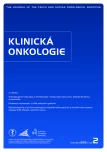A Case Report: Neutropenia Grade IV and Febrile Neutropenia in a Metastatic Breast Cancer Patient Treated With Palliative Chemotherapy Cyclophosphamide/Myocet
Authors:
O. Kubeček
Authors‘ workplace:
Klinika onkologie a radioterapie LF UK a FN Hradec Králové
Published in:
Klin Onkol 2013; 26(2): 135-139
Category:
Case Report
Overview
Background:
Febrile neutropenia is a major toxicity of myelosuppressive chemotherapy. It is a potentially fatal complication which leads to increase in morbidity, mortality and treatment costs. Myeloid growth factors (colony-stimulating factors – CSFs) can effectively reduce the incidence of severe neutropenia in patients treated with high-risk chemotherapy regimens in both curative and palliative therapy.
Case:
We present a case of the 45-year-old metastatic breast cancer patient treated with palliative chemotherapy cyclophosphamide/Myocet who repeatedly presented with severe neutropenia, including febrile neutropenia after the second cycle of chemotherapy. Grade IV neutropenia was successfully managed with the combination of antibiotic and antimycotic drugs administered together with filgrastim. The second cycle of chemotherapy was complicated with a febrile neutropenia episode despite previous prophylactic use of pegfilgrastim. There was a complete restitution in white blood count after ten days of antibiotic and antimycotic therapy (without additional use of CSF). However, the chemotherapy had to be reduced by 25% since the third cycle and Myocet monotherapy was used since the fourth cycle. With the prophylactic use of five doses of filgrastim there was no adverse event of myelotoxicity in the fifth and sixth cycle.
Conclusion:
This case demonstrates the development of myelotoxicity in chemotherapy treated patient and the use of myeloid growth factors for the prevention and treatment of febrile neutropenia. A dose reduction was required despite the use of GSF.
Key words:
neutropenia – colony-stimulating factors – filgrastim – pegfilgrastim
Sources
1. Aapro MS, Bohlius J, Cameron DA et al. European Organisation for Research and Treatment of Cancer. 2010 update of EORTC guidelines for the use of granulocyte-colony stimulating factor to reduce the incidence of chemotherapy-induced febrile neutropenia in adult patients with lymphoproliferative disorders and solid tumours. Eur J Cancer 2011; 47(1): 8–32.
2. Aapro M, Cornes P, Abraham I. Comparative cost-efficiency across the European G5 countries of various regimens of filgrastim, biosimilar filgrastim, and pegfilgrastim to reduce the incidence of chemotherapy-induced febrile neutropenia. J Oncol Pharm Pract 2012; 18(2): 171–179.
3. Doporučení pro léčbu hematologických toxicit. In: Modrá kniha České onkologické společnosti. linkos.cz [online]. Česká onkologická společnost ČLS JEP. 16. vyd. platnost od 1. 2. 2013. Brno: Masarykův onkologický ústav 2013 : 184–192. Dostupné z: http://www.linkos.cz/files/modra-kniha/8.pdf.
4. Naeim A, Henk HJ, Becker L et al. Pegfilgrastim prophylaxis is associated with a lower risk of hospitalization of cancer patients than filgrastimprophylaxis: a retrospective United States claims analysis of granulocyte colony-stimulating factors (G-CSF). BMC Cancer 2013; 13 : 11.
5. Clark OA, Lyman GH, Castro AA et al. Colony-stimulating factors for chemotherapy-induced febrile neutropenia: a meta-analysis of randomized controlled trials. J Clin Oncol 2005; 23(18): 4198–4214.
6. Johnston E, Crawford J, Blackwell S et al. Randomized, dose-escalation study of SD/01 compared with daily filgrastim in patients receiving chemotherapy. J Clin Oncol 2000; 18(13): 2522–2528.
7. National Comprehensive Cancer Network (NCCN). NCCN Clinical Practice Guidelines in Oncology. Myeloid Growth Factors Version 1.2013. 2013. National Comprehensive Cancer Network. Dostupné z: http://www.nccn.org/professionals/physician_gls/pdf/myeloid_growth.pdf.
8. Chan S, Davidson N, Juozaityte E et al. Phase III trial of liposomal doxorubicin and cyclophosphamide compared with epirubicin and cyclophosphamide as first-line therapy for metastatic breast cancer. Ann Oncol 2004; 15(10): 1527–1534.
9. Livi L, Meattini I, Cardillo Cde L et al. Non-pegylated liposomal doxorubicin in combination with cyclophosphamide or docetaxel as first-line therapy in metastatic breast cancer: a retrospective analysis. Tumori 2009; 95(4): 422–426.
Labels
Paediatric clinical oncology Surgery Clinical oncologyArticle was published in
Clinical Oncology

2013 Issue 2
- Possibilities of Using Metamizole in the Treatment of Acute Primary Headaches
- Metamizole at a Glance and in Practice – Effective Non-Opioid Analgesic for All Ages
- Metamizole vs. Tramadol in Postoperative Analgesia
- Spasmolytic Effect of Metamizole
- Metamizole in perioperative treatment in children under 14 years – results of a questionnaire survey from practice
-
All articles in this issue
- Prognostic Factors for Cervical Cancer
- Antiangiogenic Biotherapy and Chemotherapy in Breast Cancer: Review of Literature and Case Report
- The Role of Radiotherapy in the Treatment of Malignant Lymphomas – Recommendations of the Czech Lymphoma Study Group
- Epidemiological and Clinico-Pathological Characteristics of Patients with Renal Carcinoma: A Single Institution Analysis of 544 Cases
- Castleman Disease: Retrospective Single-Center Study of Therapeutic Results in 10 Patients
- A Case Report: Neutropenia Grade IV and Febrile Neutropenia in a Metastatic Breast Cancer Patient Treated With Palliative Chemotherapy Cyclophosphamide/Myocet
- Spontaneous Remission of Acute Myeloid Leukemia – a Single Center Case Reports
- Breast Cancer Adjuvant Radiotherapy Using Active Breathing Control-Moderate Inspiration Breath-Hold – a Case Report
- Adjuvant! Online: Mind the Gap!
- Clinical Oncology
- Journal archive
- Current issue
- About the journal
Most read in this issue
- Prognostic Factors for Cervical Cancer
- Spontaneous Remission of Acute Myeloid Leukemia – a Single Center Case Reports
- A Case Report: Neutropenia Grade IV and Febrile Neutropenia in a Metastatic Breast Cancer Patient Treated With Palliative Chemotherapy Cyclophosphamide/Myocet
- The Role of Radiotherapy in the Treatment of Malignant Lymphomas – Recommendations of the Czech Lymphoma Study Group
